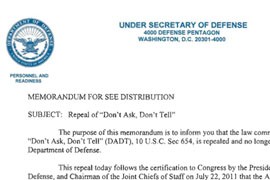Cronkite News has moved to a new home at cronkitenews.azpbs.org. Use this site to search archives from 2011 to May 2015. You can search the new site for current stories.
Don’t ask, don’t tell? Don’t worry. Bases say gay-ban repeal passes quietly
Air Force Sgt. Jaime Ciciora said she didn’t see much evidence around Luke Air Force Base this week that the “Don’t Ask, Don’t Tell” law dealing with gays in the military had been repealed.
But that doesn’t mean that there weren’t some changes, even if they were subtle.
“Personally, what I see, are comments on Facebook,” said Ciciora, of the base’s public affairs unit. “I have friends that are homosexual in the military that are posting little cryptic things and giving Facebook high-fives for the change of the policy.”
The Pentagon said it expected little fallout from Tuesday’s repeal of the law, which for the first time clears the way for openly gay people to serve in the military without fear of being kicked out.
At Luke, officials said that prediction of calm has panned out.
“Nothing is going to change. We base our operations on respect and treating everyone the same, we are just adding sexual orientation,” said Larry Schneck, public affairs superintendent for the 56th Fighter Wing based at Luke.
Homosexuality had long been prohibited in the U.S. military and gay soldiers or sailors who were discovered faced discharge. Don’t Ask, Don’t Tell, enacted in 1993, was a compromise between opponents and supporters of the ban on gays in the military.
Under the 1993 law, military officials were largely prohibited from questioning a serviceman’s sexual orientation and discrimination against or harassment of military personnel who were closeted was prohibited. But the law also prevented gay service members from declaring their sexuality.
Those who went public — or who were found out — still faced discipline and discharge from the military. The Servicemembers Legal Defense Network claims that more than 14,500 military personnel have been discharged since the law took effect in 1993.
Congress voted last year to repeal the law, clearing the way for gays to serve openly. The repeal was to take effect 60 days after the Defense Department certified that it was ready to “implement repeal in a manner that is consistent with the standards of military readiness, military effectiveness, unit cohesion, and recruiting and retention.”
All branches of the service conducted training on repeal of the law, and they certified on July 22 that they were ready for the change, setting the repeal date for Tuesday, Sept. 20.
Schneck said Tuesday was “just another day for our airmen, as we serve our nation.”
“We trained the vast majority in Don’t Ask, Don’t Tell awareness and made sure they knew the ground rules, how to act, and how to behave,” he said.
Schneck said nothing will change in the way the base is run, that officials will apply the same rules as always but with one element added.
One key is that servicemen and women will continue to show respect and dignity on base and off, he said. Another is that military personnel are expected to display the same level of professionalism on base as before, Ciciora said.
“You still cannot display affection whether you are gay or straight,” said Ciciora, adding that there will still be zero tolerance for public displays of affection.
But there is one change, Ciciora said. The repeal of the old policy means that personnel now can share their relationships with their co-workers.
“It is a topic that people have brought up,” she said. “The main difference for them (gay service members) is they get be open about it and have a picture on their desk of a loved one.”







